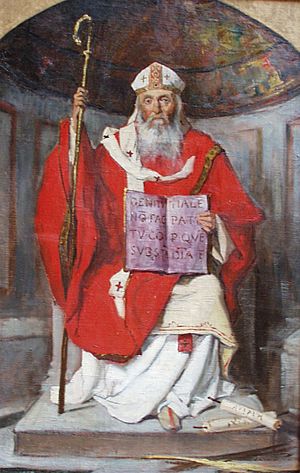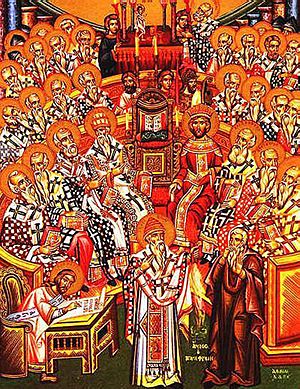Hosius of Corduba facts for kids
Quick facts for kids Hosius of Corduba |
|
|---|---|
 |
|
| Diocese | Córdoba |
| See | Córdoba |
| Personal details | |
| Born | 256 Corduba, Hispania, Roman Empire |
| Died | 359 |
| Denomination | Christianity |
| Hosius of Corduba | |
|---|---|
| Honored in | Catholic Church, Eastern Orthodox Churches, Oriental Orthodox Churches |
Hosius of Corduba (born around 256, died 359) was an important bishop from Corduba, which is now Córdoba, Spain. He was a strong supporter of a key Christian belief called Homoousion, which said that Jesus and God the Father are of the same substance. This belief was part of a big debate in early Christianity known as the Arian controversy.
Hosius likely led the famous First Council of Nicaea and also the Council of Serdica. He was one of the most trusted Christian advisors to Emperor Constantine the Great. He even helped the emperor write important speeches about Christianity.
Contents
Life of Hosius
Hosius was born in Corduba, a city in Hispania, which was a province of the Roman Empire.
Early Career
Around the year 295, Hosius became the bishop of Corduba. He faced great danger during a time when Christians were persecuted by Emperor Maximian. In 300 or 301, he attended a meeting of church leaders called the Synod of Elvira. At this meeting, he supported strict rules for Christians. These rules included guidelines about priests getting married and how to treat Christians who had given up their faith during tough times.
Advisor to Emperor Constantine
In 313, Hosius was at the court of Emperor Constantine the Great. He is mentioned in a letter the emperor sent to a bishop named Caecilianus in Carthage. Hosius might have been with the emperor during his first war with Licinius in Pannonia.
Around 320 or 321, Bishop Alexander of Alexandria held a meeting where many bishops strongly disagreed with the ideas of Arius. In late 324, Hosius delivered a letter from Emperor Constantine to Bishop Alexander and Arius, asking them to make peace.
After this, Hosius led another meeting in Antioch. This meeting was probably to choose a new bishop, Eustathius. At this meeting, bishops who supported Arius were temporarily removed from their duties. They also announced a larger meeting, which Emperor Constantine later moved to Nicaea.
The Council of Nicaea
The First Council of Nicaea began on May 20, 325. Hosius likely led this important meeting, as his name is first on the list of people who attended. He strongly supported Bishop Alexander of Alexandria against Arius's teachings. After the council, Hosius went back to his home in Spain.
Later Years and Exile
For almost 50 years, Hosius was one of the most respected bishops of his time. He was highly regarded and had a lot of influence. After Constantine died in 337, a bishop named Eusebius of Nicomedia, who supported Arius, became the leader of the church in Constantinople.
Eusebius and his supporters pressured Emperor Constantius II to remove Athanasius of Alexandria, a strong opponent of Arianism, from his position. Eusebius also wanted Hosius, who supported Athanasius, to come to Milan. Hosius refused to condemn Athanasius. He impressed the emperor so much that he was allowed to return home.
Hosius played a key role at the Council of Serdica, which started in 343. He was the first to sign the official documents from this council.
However, Eusebius continued to pressure the emperor. Emperor Constantius wrote a letter asking Hosius why he was the only one still supporting Athanasius. In response, Hosius sent a brave letter in 353. In this letter, he protested against the emperor interfering in church matters. This letter is still preserved today.
Because of his strong stance, Hosius was sent away in 355 to Sirmium, a city in Pannonia (modern Serbia). From his exile, he wrote his only surviving letter to Emperor Constantius II. A French historian described this letter as showing great seriousness, dignity, kindness, wisdom, and generosity. It truly showed the qualities of a great person and a great bishop.
Under constant pressure from the group supporting Arius, Hosius eventually signed a statement in 357 at the Third Council of Sirmium. This statement allowed him to be in communion with some groups who had similar beliefs to Arius, but it did not mean he condemned Athanasius. After this, he was allowed to return to his diocese in Spain, where he died in 359.
There is also a letter from Pope Liberius to Hosius from around 353.
See also
 In Spanish: Osio de Córdoba para niños
In Spanish: Osio de Córdoba para niños
 | Isaac Myers |
 | D. Hamilton Jackson |
 | A. Philip Randolph |


